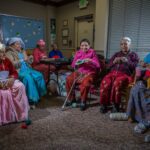The object of this study was to describe a feasibility study of the Tea and Families Education and Support (TAFES) intervention used in a group of newly resettled adult refugees from Kosova. The subjects were 86 newly resettled Kosovar refugees in Chicago who gave informed consent to participate in an investigation of the TAFES intervention. All subjects received family home visits, and most participated in the TAFES multi-family groups. The TAFES program had contact with 61 Kosovar refugee families, of which 42 families (69%) engaged in TAFES groups, including families with educated and working members. The uncontrolled post-intervention assessments demonstrated increases in social support and psychiatric service use associated with engagement in the TAFES group. Participants also showed time changes in scale scores assessing trauma mental health knowledge, trauma mental health attitudes, and family hardiness. This study provides preliminary evidence that multi-family support and education groups are a feasible and possibly beneficial intervention for newly resettled refugees and indicates the need for further studies.
Bystanders of ethnic victimization: Do classroom context and teachers’ approach matter for how adolescents intend to act?
The study examined how adolescents’ individual characteristics and class context are related to bystander behaviors in cases of ethnic victimization. The sample included 1065 adolescents

